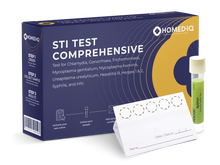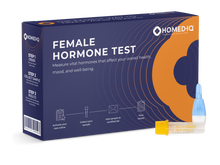Testicular pain: 6 causes and when you should see a doctor
Testicular pain is a symptom that can indicate various health problems. The testicles are an important organ for reproduction and are highly sensitive to pain stimuli. Pain in the testicles that lasts longer than an hour should be examined by a doctor. The causes of testicular pain can vary and range from minor injuries, such as a bruise, to more serious conditions such as sexually transmitted infections or testicular cancer. In this blog article, we will explore what exactly testicular pain is, what causes it may have, and when it becomes a serious issue. Unfortunately, many men (assigned male at birth) hesitate to talk about health problems involving the testicles due to shame and concern.
Table of Contents
- What is testicular pain?
- What causes testicular pain?
- Who can be affected by testicular pain?
- Sexually transmitted infections and testicular pain
- What symptoms can occur alongside testicular pain?
- How is testicular pain treated?
- Summary
What is testicular pain?
Testicular pain refers to discomfort that can affect one or both testicles. A distinction is made between:
-
Acute testicular pain: occurs suddenly, often severe and within a few hours.
-
Chronic testicular pain: lasts longer than 3 months and can be recurring.
When is testicular pain dangerous?
If severe pain occurs suddenly and lasts longer than an hour, you should definitely see a doctor—especially if additional symptoms such as swelling, nausea, and vomiting are present (Cleveland Clinic, 2023).
What is the function and importance of the testicles?
Biological men usually have two testicles located in the scrotum. They perform important functions:
-
Production of sperm: about 200 million sperm per day.
-
Production of testosterone: important for beard growth, voice change and muscle development.
-
Temperature control: outside the body in the scrotum, the temperature is lower, which is necessary for sperm maturation.
-
Epididymis: store sperm and transport them via the vas deferens (Britannica, 2024).
Source: Britannica, 2024
What causes testicular pain?
Below you will find 6 causes that are frequently associated with testicular pain:
1 – Traumatic cause
This refers to injuries to the testicles caused by the following situations:
- Accidents: Such as slipping off a bicycle saddle.
- Sports injuries: Especially in contact sports like football, hockey, or martial arts, the testicles can be struck if not adequately protected.
- Physical impact: This includes, for example, kicks or blows to the testicular area (Coward, 2023).
2 – Infection-related causes
- Orchitis (inflammation of the testicles): This refers to direct inflammation of one or both testicles. It can be caused by bacterial sexually transmitted infections, such as chlamydia or gonorrhea, viral infections such as mumps, or by nearby infections, such as in the epididymis or prostate.
- Epididymitis (inflammation of the epididymis): Pain in the testicles can also result from inflammation of the epididymis, which is located in the scrotum above the testicles. This condition may also be caused by sexually transmitted pathogens, bacterial infections such as urinary tract infections, or a testicular torsion (twisting of the testicle), and it can last for several weeks. Approximately 600,000 boys and men are diagnosed with epididymitis annually.
- Epididymo-orchitis: This condition occurs when both the testicles and epididymis are inflamed.
- Sexually transmitted infections: STIs, especially chlamydia and gonorrhea, can lead to testicular pain due to inflammation in the testicles or epididymis (Harvard Health, 2023).
3 – Problems with the blood supply to the testicles
- Testicular torsion: This is a painful twisting of the testicle, which cuts off its blood supply. This is a medical emergency and requires immediate treatment (within 6 hours) to prevent permanent damage or loss of the testicle. Testicular torsion often occurs without a clear cause and is seen in 65% of cases in individuals aged 12 to 18 who were assigned male at birth.
- Varicocele: This condition refers to swollen veins in the scrotum. In most cases, it is asymptomatic but can also cause testicular pain. Varicoceles should be monitored, as they may lead to infertility ( Mayo Clinic, 2023; Harvard Health, 2019).
4 – Other medical conditions
- Kidney stones: Kidney stones are crystallized components of urine that can lodge in the structures of the kidneys. Men are generally more affected than women. When kidney stones move and become lodged in the ureter, they can cause severe cramping pain that radiates to the genital area due to the shared nerve pathways. As a result, pain is often felt in the testicles.
- Inguinal hernia: This condition occurs when tissue (usually part of the intestine) protrudes through a weakened area in the abdominal wall into the groin. This weakness can be congenital or acquired—for example, due to obesity or chronic coughing—and can lead to testicular pain, either by radiating into the genital area or by compressing nerves that serve the testicles.
- Hydrocele: Also known as a fluid-filled sac in the scrotum, this is a common condition in newborns. Fluid accumulates in the scrotum because the inguinal canal remains open. In most cases, hydroceles resolve on their own during early childhood (PennMedicine, 2022).
5 – Serious testicular diseases
-
Testicular cancer: This is a malignant tumor that most commonly develops in the tissue of one testicle, and rarely in both. Although testicular cancer is generally rare—affecting about 1 in 250 individuals—it is the most common type of cancer in people assigned male at birth between the ages of 15 and 35. The most important sign of testicular cancer is a painless lump or swelling in the testicle, although pain may also occur. If detected early, testicular cancer is highly treatable (NHS, 2024).
6 – Idiopathic causes
Idiopathic causes refer to testicular pain that occurs without an identifiable cause. Some biological males, for example, experience chronic testicular pain without a clear underlying reason. Even so, you should never hesitate to seek medical advice if you experience pain (Mayo Clinic, 2023).
Who can be affected by testicular pain?
Testicular pain can affect biological males at any age. In particular, traumatic and infection-related causes can occur at any time in life. On average, testicular torsion and testicular cancer are more likely to affect younger individuals, while older people are more often affected by testicular pain related to kidney stones or inguinal hernias.
What can I do to prevent testicular pain?
To prevent testicular pain, here are some tips:
-
Regular self-examinations for early detection of changes.
-
Protective measures during sports or physical work.
-
Safer sex to avoid STIs.
-
Early consultation with a doctor at the first signs.
Source: Mayo Clinic, 2023
Sexually transmitted infections and testicular pain
Sexually transmitted infections (STIs) are a common cause of inflammation of the testicles or epididymis, which can lead to testicular pain. However, because pain in the genital area is often associated with shame, many people find it difficult to seek medical attention. Homed-IQ offers the opportunity to test for a variety of STIs from the privacy of your own home. The Comprehensive STI Test and the Basic 4 STI Test screen for several infections, including chlamydia, gonorrhea, and trichomoniasis, while the Chlamydia Test is specifically focused on this particular infection.
What symptoms can occur alongside testicular pain?
Testicular pain is often accompanied by other symptoms. The following table provides an overview of which symptoms may occur depending on the cause of the testicular pain. However, it is important to note that the exact presentation of symptoms can vary from person to person. If you experience any of these symptoms, you should consult a doctor for evaluation to prevent early complications:
| Cause | Possible symptoms |
|---|---|
| Infections | - Pain and swelling - Redness and warmth of the scrotum - Fever and weakness - Painful urination |
| Sexually transmitted infections | - Discharge from the penis - Burning during urination - Pain in the testicles - Swelling of the scrotum |
| Testicular torsion | - Sudden, severe pain in the testicle - Swelling and redness of the scrotum - Nausea and vomiting |
| Kidney stones | - Pain radiating to the lower abdomen and groin - Blood in the urine - Frequent urination and burning sensation while urinating |
| Testicular cancer | - Painless lump in the testicle - Feeling of heaviness in the scrotum - Dull pain radiating from the testicle to the lower abdomen and groin |
Source: Coward, 2023; Cleveland Clinic, 2023
How is testicular pain treated?
Treatment always depends on the cause:
-
General: cooling, elevation, rest (e.g. after a bruise).
-
Medication:
-
Antibiotics for bacterial infections or STIs.
-
Painkillers for relief and anti-inflammatory effect.
-
Antiviral drugs for viral infections (e.g. mumps).
-
-
Surgery:
-
Immediate surgery in testicular torsion.
-
Procedures for varicocele, hydrocele or severe injuries.
-
Removal of testicular cancer, possibly with radiation or chemotherapy.
-
Source: Cleveland Clinic, 2023
Summary
Testicular pain is a common symptom that can point to various health problems and can be either acute or chronic. It becomes concerning when the pain comes on suddenly, is especially intense, or lasts longer than one hour—especially if accompanied by other symptoms such as swelling, nausea, or vomiting. The main causes of testicular pain can be divided into six categories: traumatic causes, infection-related causes, circulatory disorders, other conditions such as kidney stones or hernias, serious diseases such as testicular cancer, and idiopathic causes. Treatment for testicular pain depends on the underlying cause and may include medical interventions such as antibiotics and painkillers, surgery for testicular torsion or testicular cancer, and supportive measures such as cooling and elevation.









